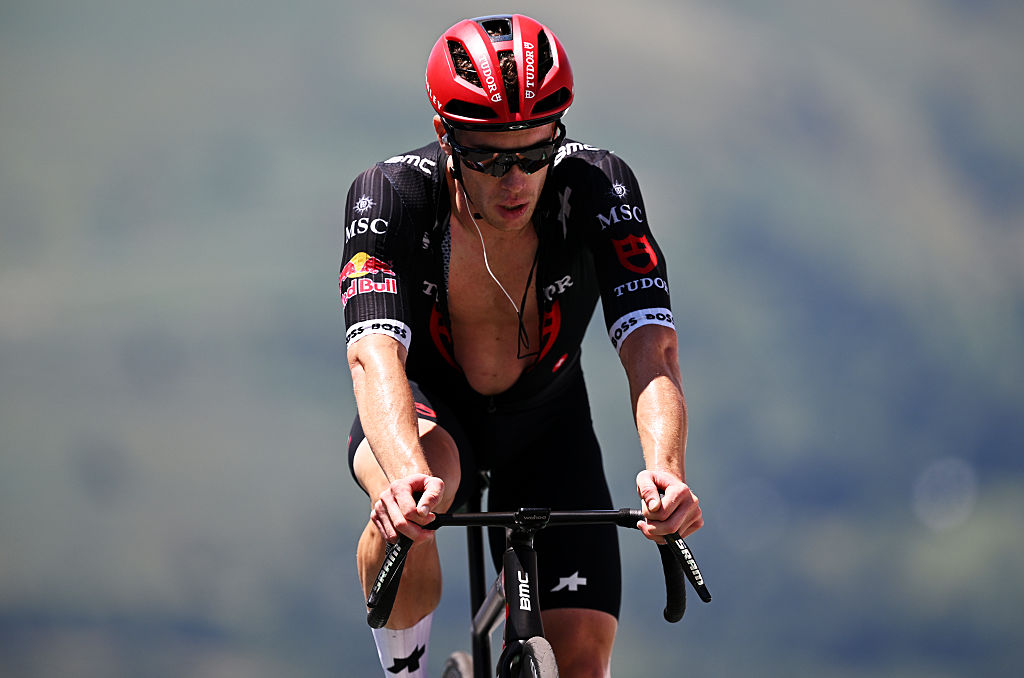Chasing Cancellara: How a 310km ride from Bern to Zermatt really tested me
I headed to Switzerland to ride the 310km Bern to Zermatt round of the Chasing Cancellara series
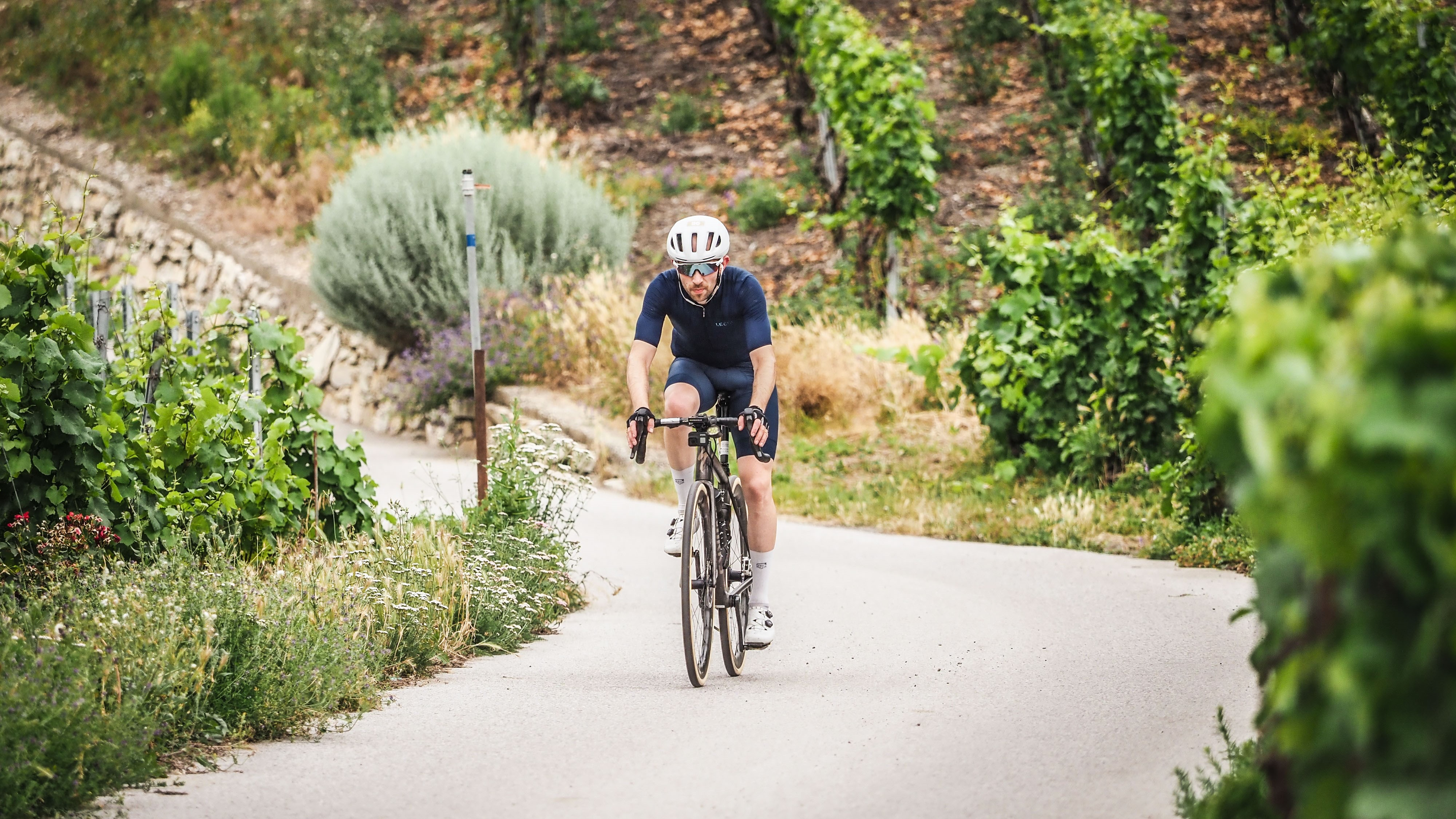
Lightning broke the mountain-filled darkening sky and thunder boomed as I headed towards the 265km checkpoint of Chasing Cancellara; Bern to Zermatt. As the first drops of rain began to fall, I couldn't help but nervously think to myself: "You just might be in trouble here."
I was asked earlier in the year if I'd like to go and ride the Chasing Cancellara sportive for Cyclingnews and I jumped at the chance. A few months on I'd arrived in Switzerland and was about to take on the challenge. I'd rolled out from the ride start in Bern hours earlier at 2:18 AM. Yep, Chasing Cancellara starts at 2 AM, and I'd been on the road for almost 12 hours as the heavens began to open.
Bern to Zermatt is a round of ex-road cycling star Fabian Cancellara's sportive event series which began several years ago. The route is just under 310km in length and takes in about 5000 metres of climbing. The 310-kilometre event is a little unusual in its format, the ride begins at 2 AM on Saturday morning with riders released in small groups at short time intervals and I was riding the 'singles' category which meant I would ride the whole distance solo. There are doubles, doubles relays and a team of three options if you want to break the effort up a bit. Oh, and if you're a singles rider, there's no drafting allowed after the first 35km, a sign on the road marked this point out loud and clear.
So a 2 AM start, just under two hours of sleep off the back of a day travelling from the UK, no drafting after 35km and 310km with the most climbing I'd ever done. I wanted a challenge, and it looked like I was going to get one.

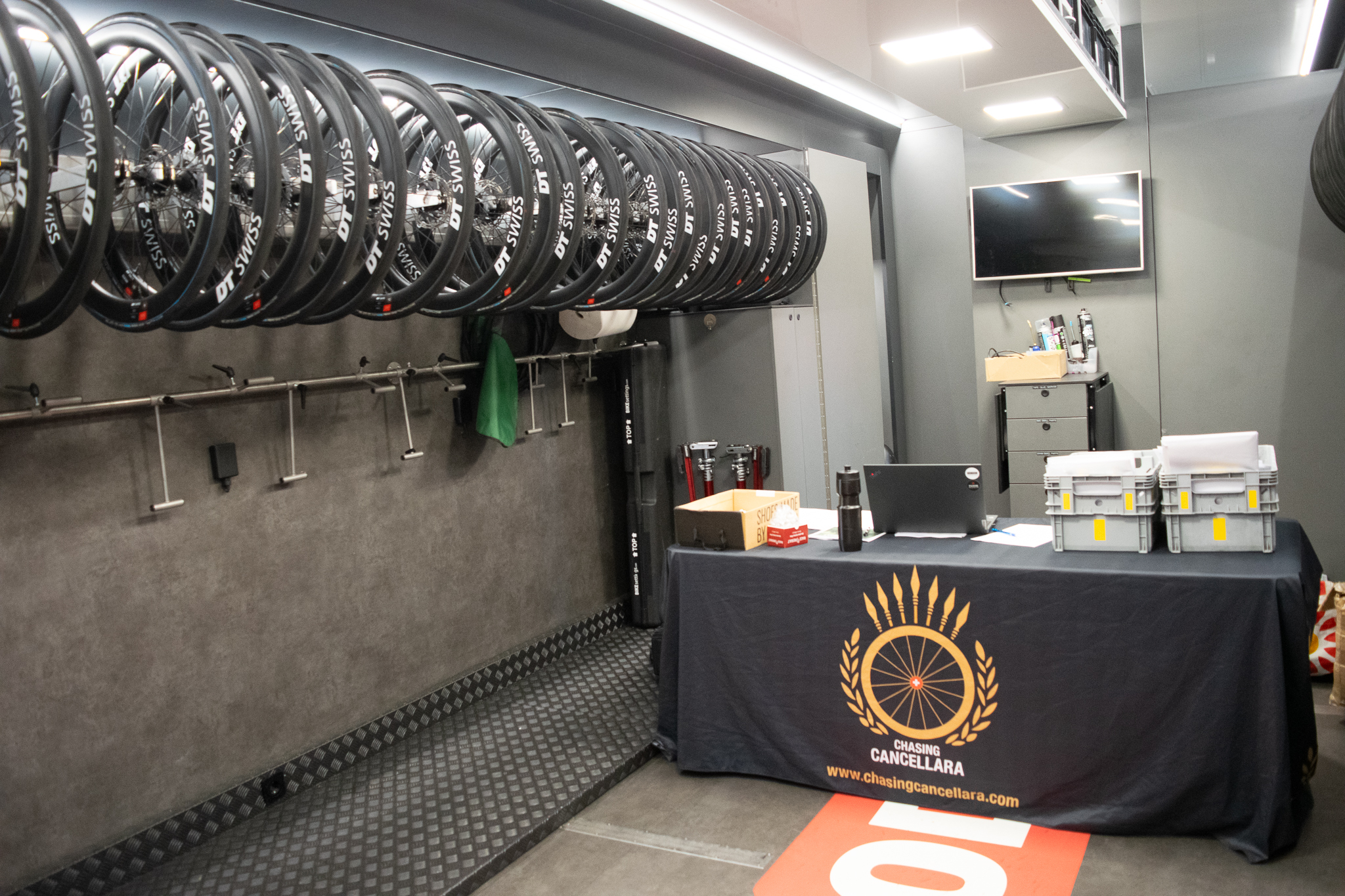
After arriving at my hotel in Bern, I rolled down to the start village to pick up my number pack. Knowing I'd start in just a few hours as night fell instead of the next day felt odd. It really did feel like the calm before the storm. I prepared my kit, pinned on my number, and attached the included timing and reflective stickers to my bike.
I also got an espresso from the hotel coffee machine before I went to bed, dumped some sugar in and left it waiting. Knowing there would be no coffee in the morning I wanted some caffeine to get me going.
I finally turned off the lights at about 11:20 pm after making sure everything was ready, and set my alarm (and four subsequent alarms) for 1:15 am. This was one alarm call I could not sleep through.
I awoke thankfully feeling fresh, excited and ready for the off, not completely exhausted as I feared. My little cold espresso was waiting for me, and the boost would be welcome for the night leg of the ride. I got changed, checking that everything was in order on the bike and that I had everything I needed. And set off into the night to roll the mile downhill to the start zone.
The start area was a blur, I donned the reflective bib that all riders are required to wear until the sun is up later in the ride, found my place in the start order and before I knew it we were being set off. My group of four rolled out in the still night air from Bern and quickly got into our stride, one of my group, Fabian (not that one), and I introduced ourselves and instantly settled into a nice, smooth rhythm together.
After lots of travelling, and mentally preparing and checking all of my kit for the ride it felt fantastic to finally set off and just focus on the riding as my pre-ride stress melted away into the night. The opening few kilometres on empty roads were fast and smooth. A few groups passed us travelling at pace, so fast I just thought 'no way, not yet' and let them disappear into the night. Fabian and I rode together in the dark until we came to the first proper climb of the day where I let him go. I remembered the advice from coach Zach Nehr in my preparation for the event, and kept the heart rate low, but now I was on my own with only the road in front of me.
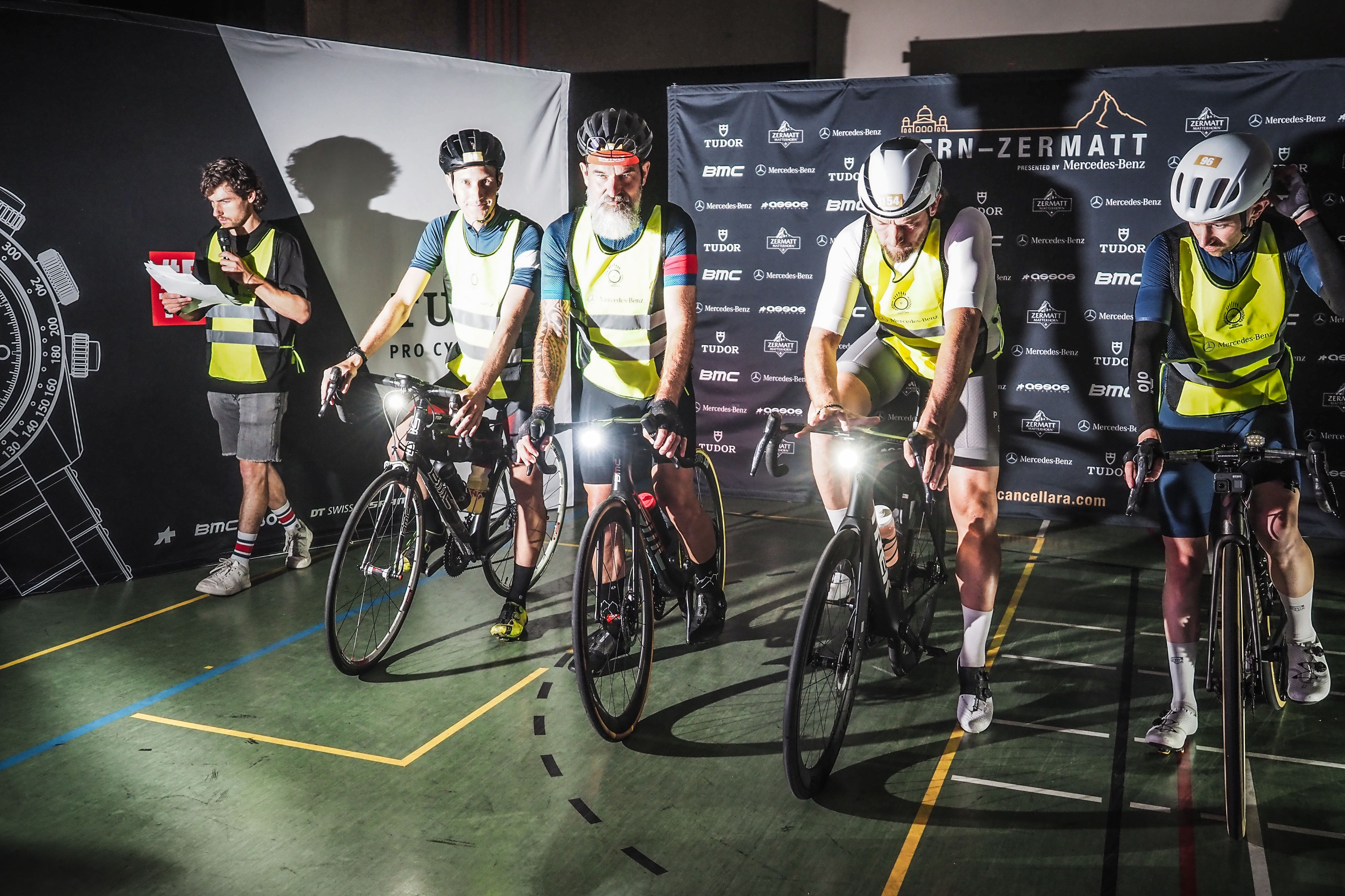
You couldn't have asked for better conditions to ride through the night and I'll long remember the ride through to dawn. The temperature was a comfortable 17/18 degrees C. And it was perfectly calm, still and quiet with little cloud cover and a bright moon to help light the way.
I rode with groups where I could until the sign signalling no drafting loomed into view and the riders around me drifted and let the wheels go. Motorcycle marshals zoomed past throughout the day quietly checking the rules were being followed. The first feed zone at 45km was peaceful and quiet and I refilled a bottle and set off on my way again.
The nighttime hours felt like a real adventure. But at around 4:15 am the sky slowly started to lighten, the blackness giving way to vague outlines and shapes and I started to get a feel for the scenery that was all around me. Dawn was coming and I was on a high as the morning arrived.
The sunlight revealed the scenery I was riding through and the first 140-odd kilometres of the ride contained some of the most stunning. The area around the Mittelberg and the Col du Pillon climbs was beautiful, complete with all of the things you may imagine when it comes to Switzerland. Mountain backdrops, forests and rolling hills in the foreground and beautiful wooden Swiss chalets. All soundtracked by the clanking of the traditional metal cow bells that help farmers keep track of their cattle.
I crested the Col du Pillon at 140 kilometres, nearly halfway into the ride, and also the point you are allowed to remove your reflective vest. I did this, refuelled and tackled the descent for the second half of the ride. I'd stayed within myself on the climbs so far, was eating and drinking well and was ready to get stuck into the rest of the day.
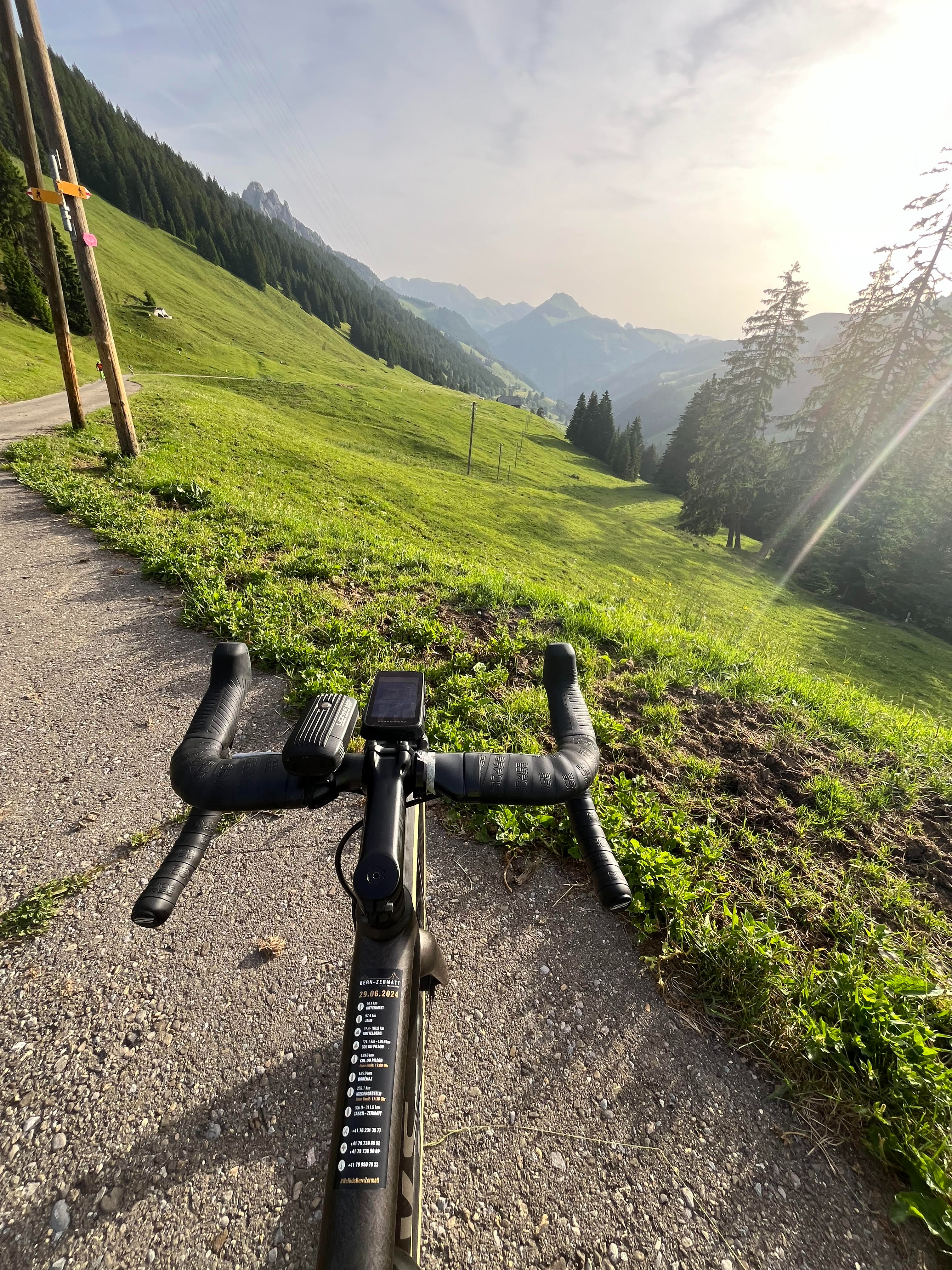
As a member of the Cyclingnews Tech team, I'm almost contractually obligated to mention my bike setup and kit choices. I was riding a Specialized S-Works Aethos for the event, which is the bike I've been testing the new SRAM Red AXS groupset. A lovely, lightweight bike I've gelled very well with over several months, it was ideal for the job at hand and I felt lucky to have it.
Gearing was 35-48T / 10-33T and was fine all day. I also fitted some 32mm Vittoria Corsa Pro tyres for a mix of speed and comfort, these are also the right size to play nicely with the 25mm hookless Zipp rims and I had zero mechanical issues or flats during the ride, the Swiss tarmac and road surfaces were generally all very good.
I won't list all of the kit I used here, I don't want to bore you, but I'll just touch on a few points you hopefully find interesting. I packed some silicone Velotoze toe covers into my saddle bag in case it turned into a wet day. Along with my rain jacket, I felt this combo would provide some decent protection in the generally warm temperatures.
I chose to use the Scott Cadence helmet which placed fourth in our recent wind tunnel aero helmet test, so I knew I had a relatively quick lid on. I also took advantage of its clip-on rear light to add some extra visibility for the nighttime section which made me feel a bit safer. It was comfy all day and ventilation was good for an aero-focused helmet.
I also had screenshots on my phone of my Lezyne lights modes and run times. I was worried about ending up in the wrong mode and draining my batteries which would have left me riding in the dark. It's a tiny point, but it eliminated a little extra mental stress and I knew if I stuck to the right zone, light battery wouldn't be an issue. It turned out I had even fewer hours of dark than I anticipated but it was still comforting.
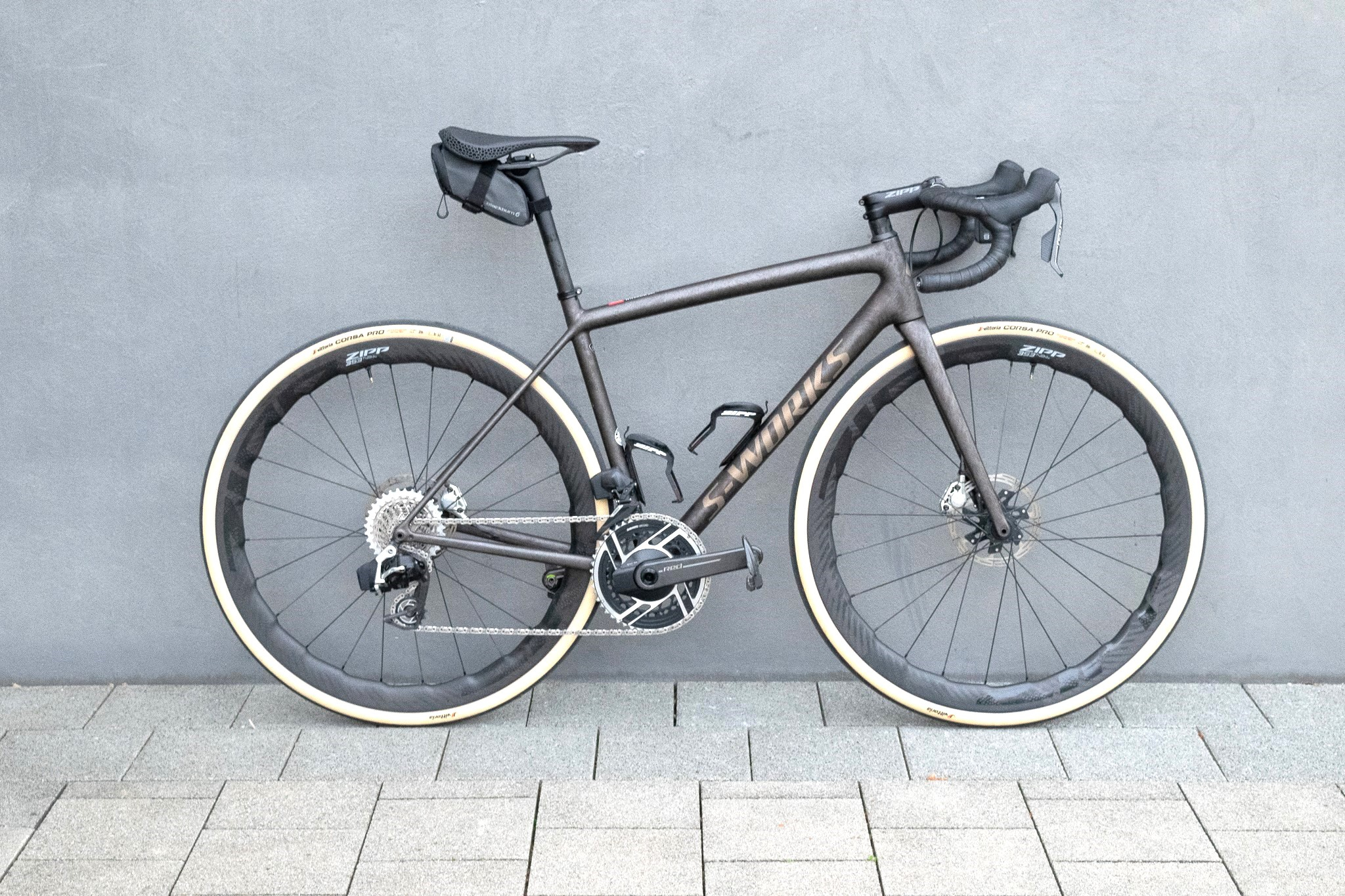
Not too far after the climbs of the Mittelberg and Col du Pillon at around the 170-kilometre mark came long flat, wide sections of path that ran next to the river Rhone for quite a few miles. There was also a strong head/cross wind for a while here and it was tough going. Think Belgian bike paths next to the canals and you'll have a good idea of what the path looked like. Whilst it was easier riding on the flat the effort was constant and there was no braking, freewheeling or corners, just constant effort. It was like riding on an indoor trainer, just pedalling away, and was both uncomfortable and mentally tough. I said out loud at one point "I'd rather be climbing now" and heard the same from another rider at a later checkpoint. This was where things started to bite and get tougher.
As the day wore on it got hotter and more humid, despite the cloud cover, my Hammerhead Karoo was displaying a steady 27/28C air temperature. The heat crept up on me over time and during these flat long sections, I really began to suffer and feel generally fatigued. At 210k in, my legs were ok, I was just feeling the heat. My feet and hands were pretty sore and possibly swollen from the heat and hours of riding and pouring some water from my bottle into my shoes provided good relief.
This was a lightbulb moment, and at the next petrol/gas station I saw I pulled in and brought a big bottle of cold water and doused myself all over in the car park. The relief was instant once back on the bike and gave me a new lease of life. The cooling effect of the water was noticeable and I went from feeling like a dried-up sponge to energised again. I've recently written a piece on cooling and core body temperature and this was a great (if unpleasant at the time) first-hand experience for me that I will draw on in the future. It's an obvious point, and riders in hotter countries you're probably smiling wryly to yourselves right now, but hailing from Britain and never doing a ride as long or as hilly as this before, it just wasn't at the forefront of my thoughts or ride strategy until I needed to do it. I didn't fully realise just how effective it would be, I kept this up until the heavens opened later on in the ride, which really cooled me down for the final big climb of the day.
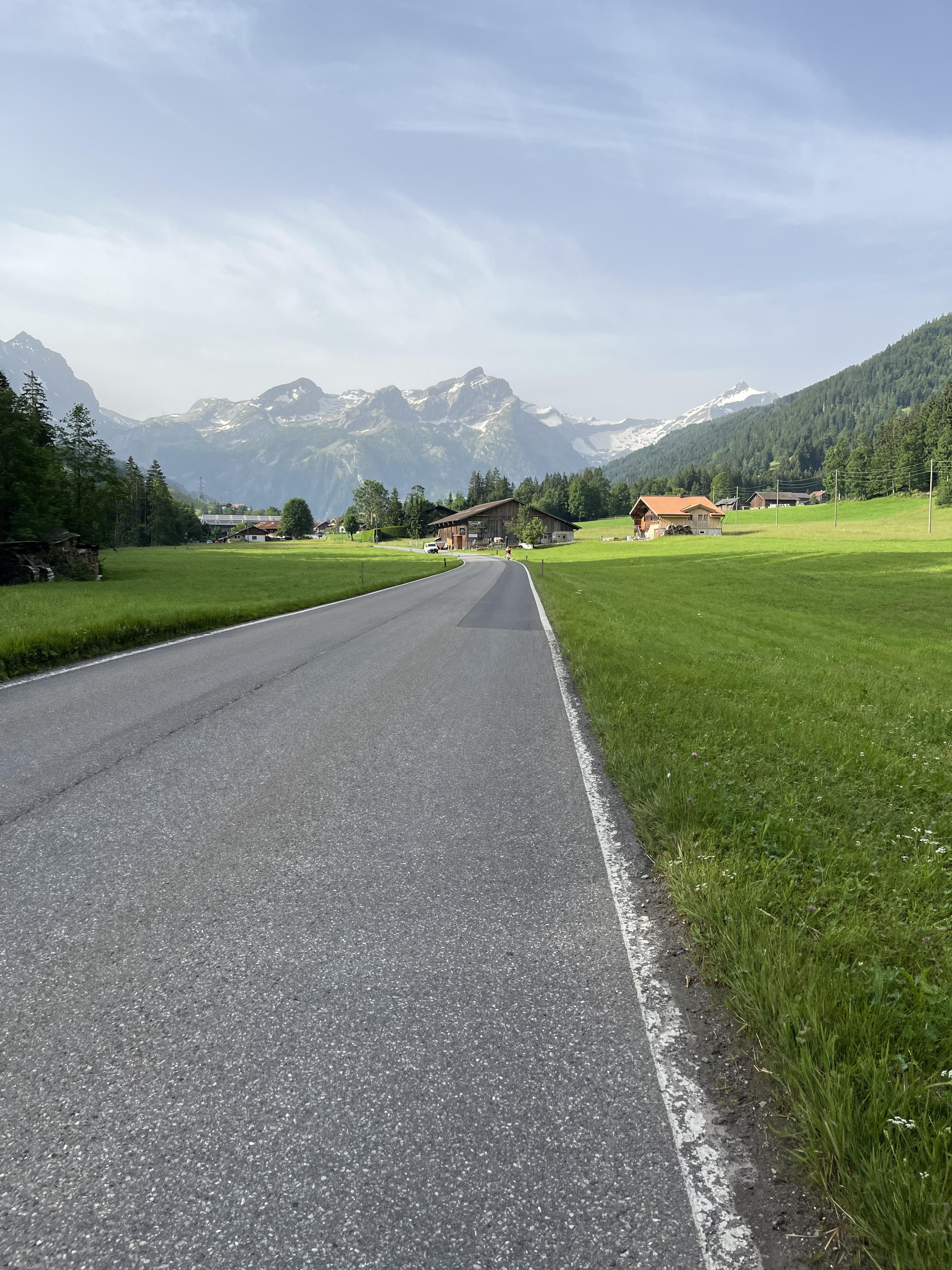
The riding between the 185km and 265km checkpoints was tough. I was just focusing on making it to 265km and then I could reset, cool off, eat and attack the final portion of the ride. But for a while heading to the 265km mark - this is where the storm I mentioned at the start rolled in - I was really having to focus and dig in.
I took some time at the feed, washed, ate and drank, refilled bottles, reloaded on gels and hit the road, this was going into the final as far as I was concerned and I was tired but ready to get stuck into the final chunk. Not long after, the worst of the storm, thunder and lightning particularly moved off for a time, but would return before I finished.
One of the aspects that makes the singles riding really tough is the lack of drafting. You're mostly on your own and on the pedals all day. The ride would undoubtedly be easier if groups were riding together and ticking off the kilometres, but it's just you out there after the opening 35km and the challenge and sense of accomplishment are purer for it.
The last hour or two of the ride were the hardest of the whole day for me. Whilst the worst of the storm passed over, the rain came properly as I started the final climb up from Visp to Zermatt. I was happy about this as it would both cool me down and help me climb more comfortably and empty the tank to the finish. The climb was tough but I wasn't on empty yet and reeled several riders in on the way up. Zermatt sits at the end of the Matter Valley and the road as you approach is flanked by mountains on either side. The imposing scenery, mist and cloud were dramatic and made for a stark contrast to the idyllic chalets and bright sunshine earlier in the ride.

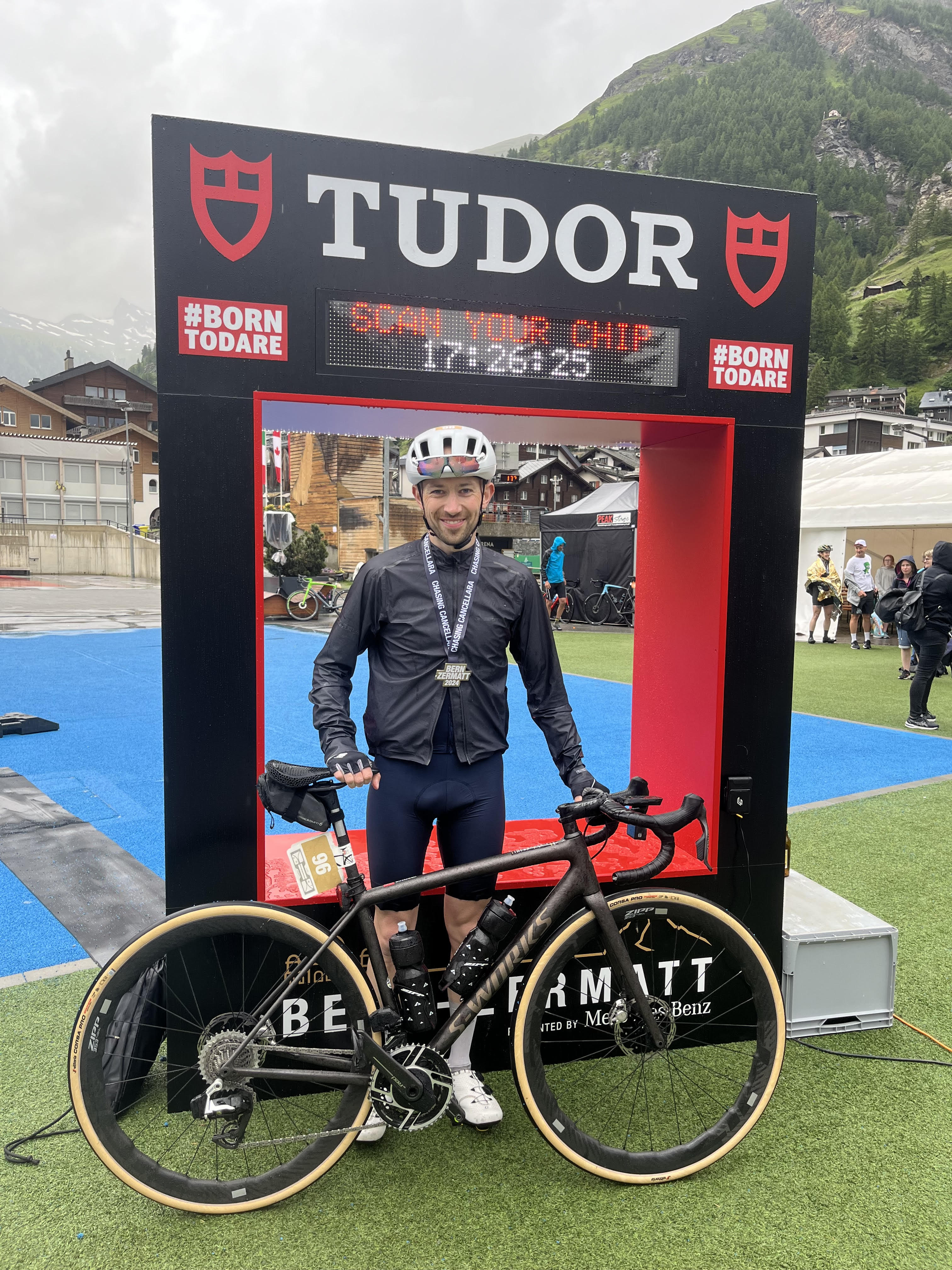
I was anticipating the climb to end on just about the 300km mark, leaving a run-in of about 3km to the finish. For some reason, probably the state I was in, I had 303km in my head as the end, though my top tube sticker clearly stated 311km as the finish.
By this point, I was mentally just all in to crack 300k in the driving rain and finish the final climb of the day. It turned out I had several more kilometres to go once summiting, and as the rain increased in intensity and the terrain flattened, I started to get cold.
The mental challenge of the added unanticipated distance and a further short climb was tough as I got colder and colder without the heat generated from climbing to keep me comfortable. I was really nailed now and it was just about pushing on to the finish. Having to stop at a red light for several minutes in the driving rain shivering was tough and I took advantage of a tunnel to stop and pull on my rain jacket for the final few kilometres which provided some welcome relief. I wasn't going to bother stopping to do this given the distance left, but it shows how cold I was getting. I passed a few riders on the run in here and the feeling of shared exhaustion was palpable, we didn't need to speak to each other to know it was just about finishing at this point.
Slowly the marker on my computer screen map for the finish came closer and I rolled into the town of Zermatt in the shadow of the cloud-shrouded Matterhorn, and into the finish area totally spent. I'd finished. A medal was placed around my neck and I managed to give a surprisingly alert reply to the announcer who asked me if the rain reminded me of home.
It wasn't the sun-drenched, pleasurable finish I'd imagined. I was soaking, shivering and absolutely shattered. But standing under a hot shower a short while later with my eyes closed reliving the ride I couldn't help but start smiling to myself. It had been an absolutely epic ride, with stunning scenery and varied terrain, and it had tested me, something I had wanted from the ride. I also kept up the Cyclingnews tradition of forgetting to bring a towel, instead using a base layer to dry myself, following in the footsteps of Josh Croxton back in 2022.
In the end, I had 310 kilometres ridden and had been on the bike for around fifteen hours total. It had indeed been my toughest day on the bike to date, and I'd go and do it again in a heartbeat.

Tom joined the Cyclingnews team in late 2022 as a tech writer. Despite having a degree in English Literature he has spent his entire working life in the cycling industry in one form or another. He has over 10 years of experience as a qualified mechanic, with the last five years before joining Cyclingnews being spent running an independent workshop. This means he is just as happy tinkering away in the garage as he is out on the road bike, and he isn’t afraid to pull a bike apart or get hands-on with it when testing to really see what it’s made of.
He has ridden and raced bikes from an early age up to a national level on the road and track, and has ridden and competed in most disciplines. He has a keen eye for pro-team tech and enjoys spotting new or interesting components in the wild. During his time at Cyclingnews, Tom has already interviewed some of the sport's biggest names including Mathieu van der Poel, Tadej Pogačar and Alberto Contador. He's also covered various launches from brands such as Pinarello, Ridley, Specialized and more, tackled the Roubaix Challenge sportive aboard his own rim-brake Cannondale SuperSix Evo, tested over 20 aero helmets in the wind tunnel, and has created helpful in-depth buying advice relating to countless categories from torque wrenches to winter clothing.
